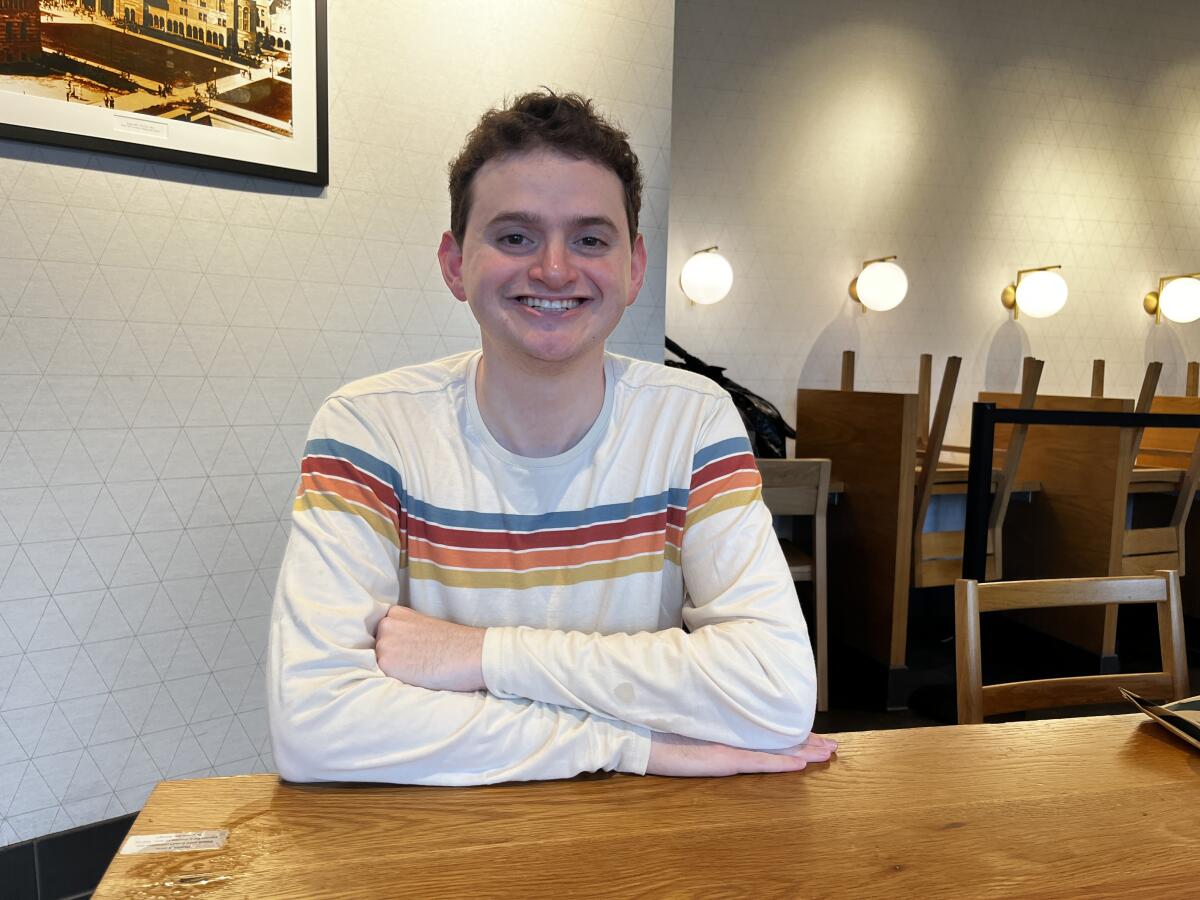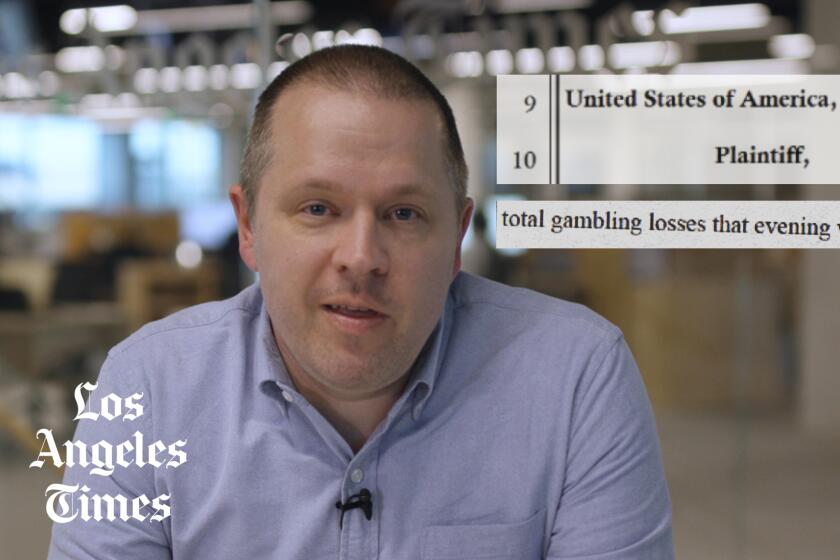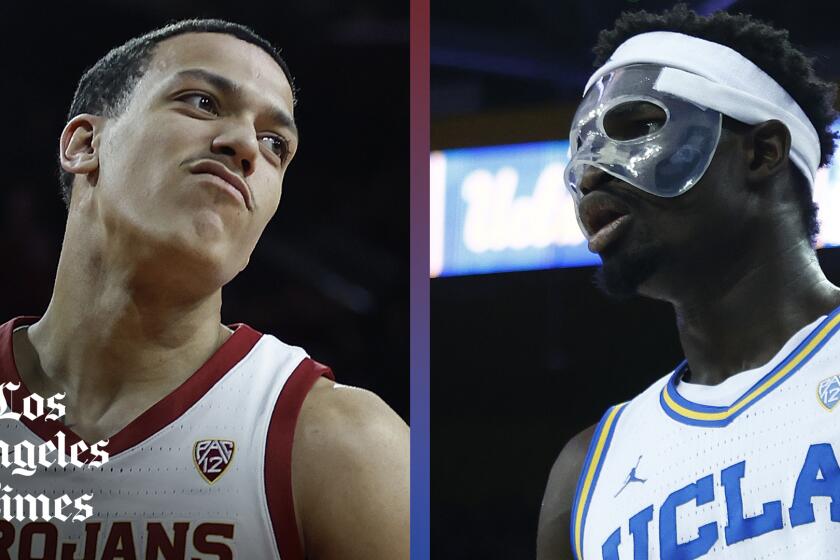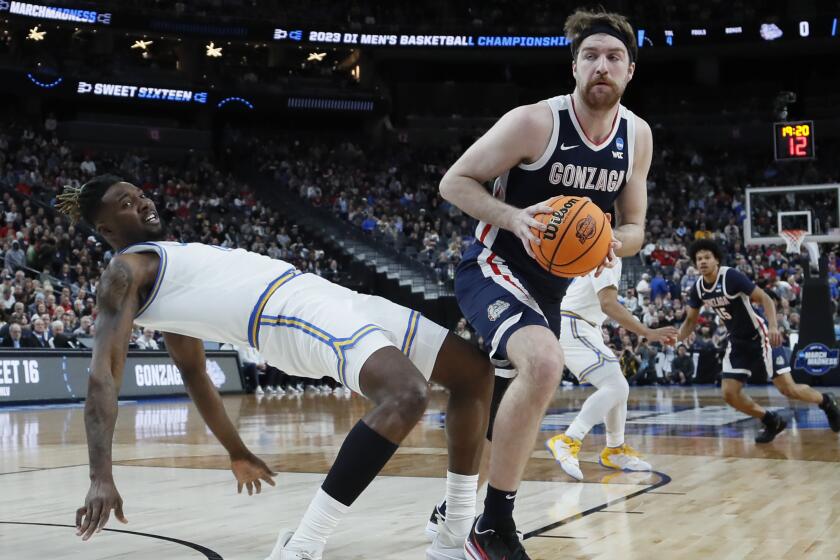One shining moment: Jake Liker near perfect predicting March Madness Selection Sunday

- Share via
When leaves ripen red, birds across the country begin heading south. When branches turn bare, bears turn to hibernation for the winter.
Come spring, the birds migrate again, and Westwood native Jake Liker feels the pull of seasonal rhythms toward the fruitless quest for perfection. He puts the finishing touches on a spreadsheet, joining hundreds of college basketball obsessives trying to predict the future through months of research.
This is bracketology, the niche prelude to March Madness: trying to guess every team’s seeding in the NCAA tournament. Liker was one of 229 brackets entered this year on a site dubbed “The Bracket Project,” a hub for both the industry professional and the humble actuary to compete against each other with their projections.
You can’t just scribble down half-baked thoughts on a piece of paper and submit it. You must have a full bracket published online. It’s a labor of love for only the truest college basketball fanatics.
It is an exercise in futility, six-year veteran David Lectka says. Study all the data you want, but at the end of the day, this practice is subject to human opinion. To sheer luck. And usually, Liker said, Selection Sunday is an invitation to disappointment, leaving bracketologists shouting four-letter words at the television.
“I would always joke … ‘this thing I do that keeps me sane,’ ” Liker said. “Or just the right amount of insane.”
So Liker, a law student at NYU home for spring break, had the lowest of hopes when sitting in his living room last Sunday. But as he started comparing the seedings to his bracket — submitted 13 minutes before the start of the show — he began turning to his parents in confidence.
“The Gaels of Iona!” he announced.
“At the 13th seed, the Gaels of Iona,” Greg Gumbel announced back from the television.
And it just. Kept. Happening.
In November 2016, the FBI launched an investigation into college basketball. It was a big, big deal.
Liker stayed up until the sun rose, scrolling social media. Nobody had come close to his score of 382. At 4:47 a.m., inside this nook of college basketball Twitter, bracketologist Joe Cook-Shugart tweeted, “Looks like somebody broke the 380 barrier this year. Congrats.”
Liker read that, and it hit him. He was the someone. He broke the barrier. A barrier nobody — not ESPN, not the Athletic, not CBS Sports — had ever touched.
Suddenly, an anxious 24-year-old trying to find his place in the world was the best bracketologist in the world.
“That was the moment I realized,” Liker said, “that I might have done something special.”
He paused. Smiled.
“Special,” he added, “is a relative term.”
Relative, in the way that bracketology is a relatively tiny practice. Much smaller than your ten-buck office pool, the traditional pick-the-Horned-Frogs-’cause-that’s-funny March Madness mayhem.
It is, however, “both an art and a science,” Cook-Shugart says. A painstaking amount of research is necessary to accurately project seedings. Bracketology, a concept widely thought of as founded by ESPN’s Joe Lunardi, is a devotion shared largely by three groups: professionals whom fans go to for reliable predictions, bloggers who do it for fun, and random fellas who have developed a habit.
Liker is somewhere between the last two groups. Like others in those groups, he speaks of bracketology like a toxic crush — with love, with agony, with an underlying knowledge of the human condition that attracts frustrating pursuit of the unattainable.
And yet 229 people were fully invested.
“Why do people care about anything in sports?” Kevin Sweeney, a college basketball writer with Sports Illustrated, said when asked why people care about bracketology. “It’s trivial at the margins, but it’s something that you find community in.”
And Liker’s accomplishment rung throughout the bracketology community: 67 out of 68 teams chosen correctly and 57 seeded perfectly. Never accomplished before in more than 15 years.
“Take it from a retired Bracketologist: That is insanely hard to do,” the Athletic’s Stewart Mandel quote-tweeted of the winning announcement.
Liker grew up a UCLA fan, joking that he comes home for spring break solely so he can watch March Madness games with family. Back in high school, he began wondering if a formula existed to fill out the perfect bracket.
Times college sports writer J. Brady McCollough makes his picks and predictions for every game in the 2023 NCAA men’s basketball tournament.
It does not. It is called March Madness for a reason, he observed. But what if, Liker wondered, there was a way to figure out what the start of that madness looked like?
Most every year since, for a six-week span until Selection Sunday, Liker has worked for six hours every Monday to copy data from 95 teams into painstaking spreadsheets.
“He is as meticulous as a person as I’ve ever met,” said Sweeney, who worked at Northwestern’s radio station with Liker when he went to school there.
His strange habit, Liker claimed, developed to the point where he could recite the profile of most any March Madness hopeful. Let’s bite.
Iowa State? 10-11 in Quad 1 (high-caliber games as determined by the NCAA), and 19-13 overall, he answered. Both correct.
USC? Three Quad 1 wins, and exactly 50th in net rating, he answered. Both correct.
Gonzaga? One Quad 3 loss — you get the point.
“No one’s ever done this to me before,” Liker laughed while being quizzed. “And now I’m realizing how crazy this is.”
In the days since, Liker’s refreshed the Bracket Matrix standings countless times, still feeling a spark of magic when he sees his name at the top.
“Thinking to myself, ‘What the hell did I just do?’ ” Liker said.
At law school, he’s felt like a fish out of water for months among those who have their life planned out. It’s been hard, and different, and a “real kick in the teeth,” as he put it, an animated voice lowering quietly.
So this bracket was nice. A hobby done better, as he tweeted, than anyone had done before.
“Just another good reminder for me and my self-doubting mind that maybe I’m going to be OK,” Liker said. “And I know what I’m doing.”
March Madness is upon us. Here’s everything you need to know about the 2023 NCAA men’s and women’s basketball tournaments.
More to Read
Get our high school sports newsletter
Prep Rally is devoted to the SoCal high school sports experience, bringing you scores, stories and a behind-the-scenes look at what makes prep sports so popular.
You may occasionally receive promotional content from the Los Angeles Times.










